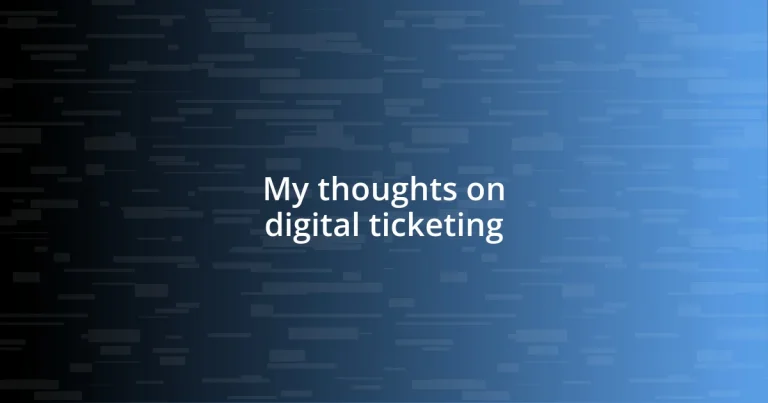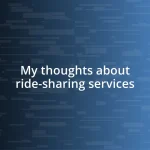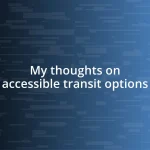Key takeaways:
- Digital ticketing enhances convenience, reduces environmental waste, and improves event experiences, allowing attendees to focus more on enjoying the event.
- Challenges such as app glitches, the digital divide, and security concerns need to be addressed for a seamless ticketing experience.
- Future trends in digital ticketing include AI integration, contactless solutions, and a strong emphasis on data security to enhance user confidence and convenience.
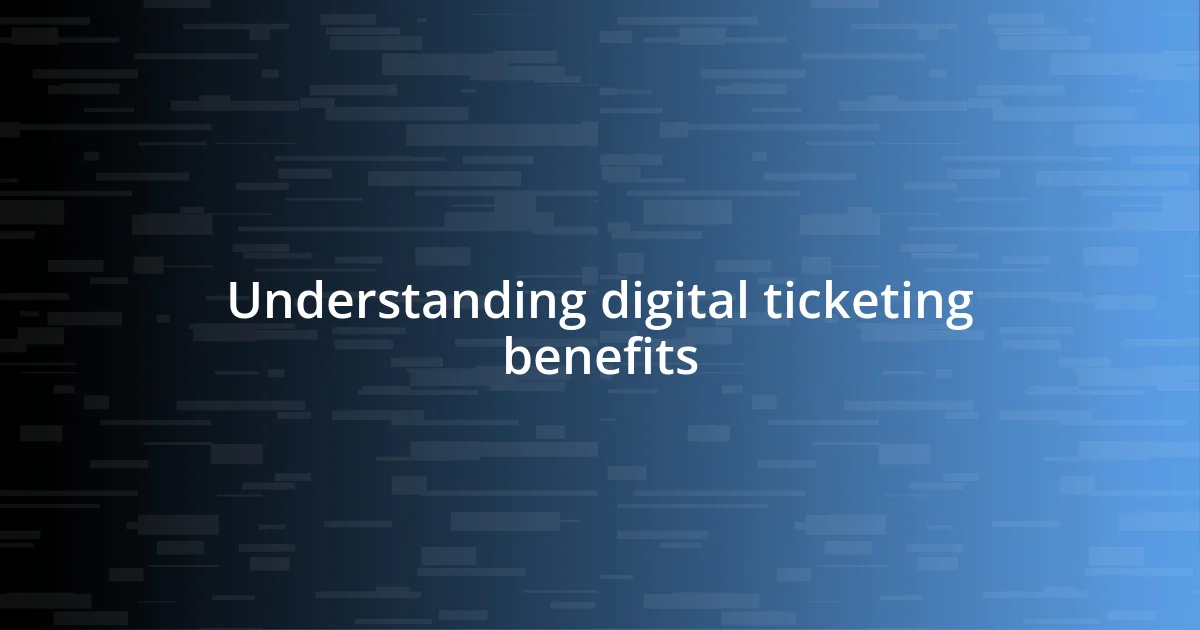
Understanding digital ticketing benefits
One of the most noticeable benefits of digital ticketing is the convenience it brings to our everyday lives. I can’t tell you how many times I used to scramble to find a physical ticket before heading out. Now, it’s just a tap on my phone, which instantly gives me a sense of relief and readiness. Doesn’t that sound appealing?
Then there’s the environmental impact. I remember feeling a bit guilty each time I discarded paper tickets after an event. With digital ticketing, that worry is gone. We’re reducing waste and making a positive contribution to the environment, which feels empowering. Have you ever stopped to consider how small changes can create larger ripples in our planet’s well-being?
Lastly, digital ticketing often enhances your experience at events. Just recently, I attended a concert where I used my digital ticket. I breezed past long lines, entered the venue quickly, and truly savored every moment without the hassle of paper. Isn’t it wonderful how technology can enhance our enjoyment and free up time for what really matters—the experience itself?
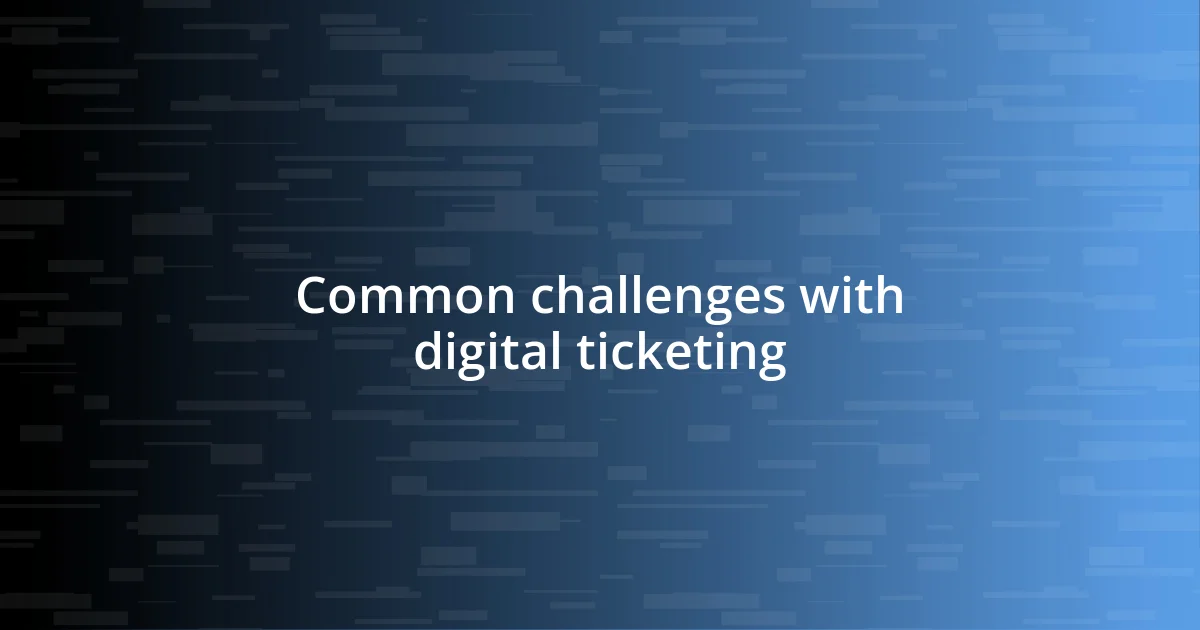
Common challenges with digital ticketing
Digital ticketing, while convenient, is not without its hurdles. I’ve encountered issues with app glitches that left me stranded outside a venue, desperately refreshing my screen. Have you ever been there? It’s frustrating when technology fails, especially after eagerly anticipating an event. Knowing that your ticket is just as accessible as your phone doesn’t always mean you’ll get in without a hitch.
Another challenge that sticks with me is the digital divide. I’ve seen friends who aren’t tech-savvy struggle with downloading and accessing their tickets. It’s a reality that can’t be overlooked—imagine the anxiety of someone just wanting to enjoy a day out but feeling lost in the digital maze. It’s crucial that ticketing systems account for varying comfort levels with technology.
Moreover, there’s the issue of security. I remember a time when I was worried about losing my phone or getting my ticket details misused online. That fear can overshadow the excitement of an event. Balancing convenience with robust security measures is essential for a more enjoyable experience for everyone.
| Challenge | Personal Experience |
|---|---|
| App Glitches | Stranded outside a venue due to a malfunction, feeling frustrated. |
| Digital Divide | Watching friends struggle with technology, understanding their anxiety. |
| Security Concerns | Constant worry of losing my phone and ticket details getting misused. |
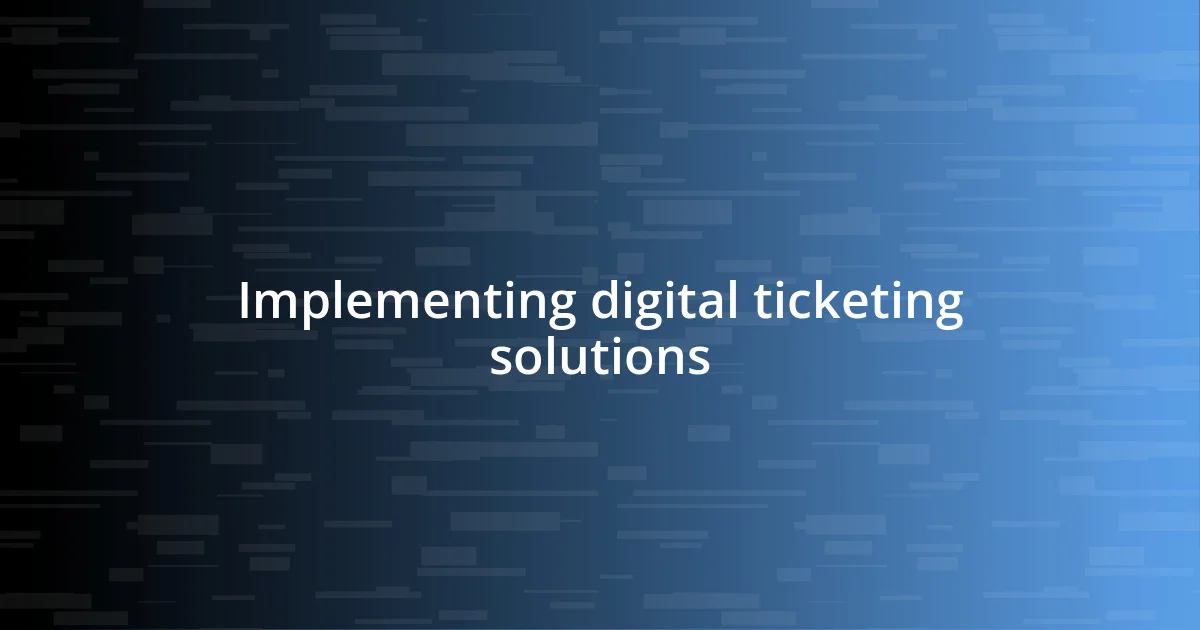
Implementing digital ticketing solutions
Transitioning to the implementation of digital ticketing solutions requires thoughtful planning and execution. In my experience, starting with clear goals is crucial. Identifying what you want to achieve can guide your decisions and ensure a smoother transition for everyone involved.
- Assess your current ticketing system: Take stock of what works and what doesn’t.
- Choose the right technology partner: Look for vendors with proven experience in digital ticketing solutions.
- Pilot testing: Run a small-scale trial to identify any issues before full deployment.
- User training: Invest in resources to help both staff and customers navigate the new system.
- Gather feedback: Keep the lines of communication open for users to share their experiences and concerns.
Establishing a capable digital ticketing solution can significantly reduce headaches for both event organizers and attendees. Reflecting on my past experiences when I’ve had to adapt to new systems, I realized that gradual implementation with ample user support made all the difference. The excitement of using a streamlined digital process outweighed initial fears of change.
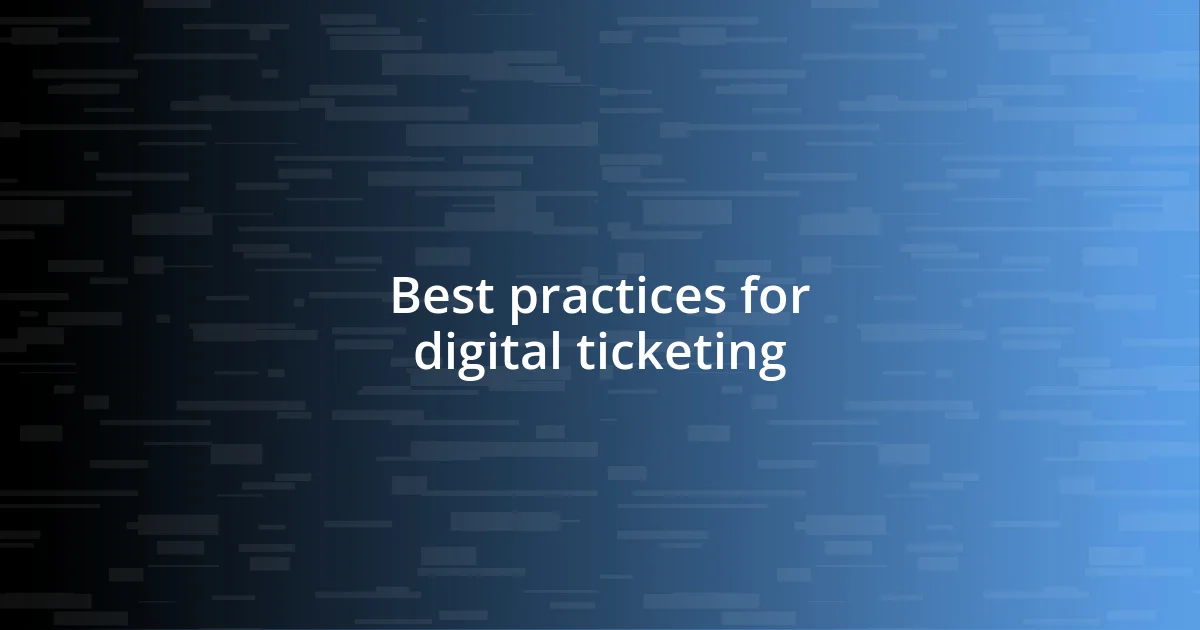
Best practices for digital ticketing
When it comes to best practices for digital ticketing, ensuring a smooth user interface is paramount. I vividly remember attending a concert where the ticketing app was cluttered and confusing. I found myself wasting precious moments trying to navigate through screens, which only added to my pre-event jitters. A simple, intuitive design goes a long way in enhancing user experience—have you ever felt lost in an app? Streamlined interfaces can help prevent that feeling.
Providing clear communication channels is another essential practice. I’ve attended events where the organizers failed to update ticket holders about changes in entry requirements. Can you imagine showing up only to be turned away due to a last-minute policy change? Keeping attendees informed via timely notifications can significantly alleviate anxiety and ensure that everyone feels prepared and welcomed.
Lastly, implementing a robust customer support system is key. One time, I had a friend who encountered an issue with her digital ticket just moments before entering a venue. Panic set in as we couldn’t find someone to assist her right away. Having accessible customer support—whether through chat, phone, or in-app assistance—creates a safety net that can make a difference during critical moments. It builds trust and confidence in the digital ticketing system, reassuring attendees that help is just a tap away.
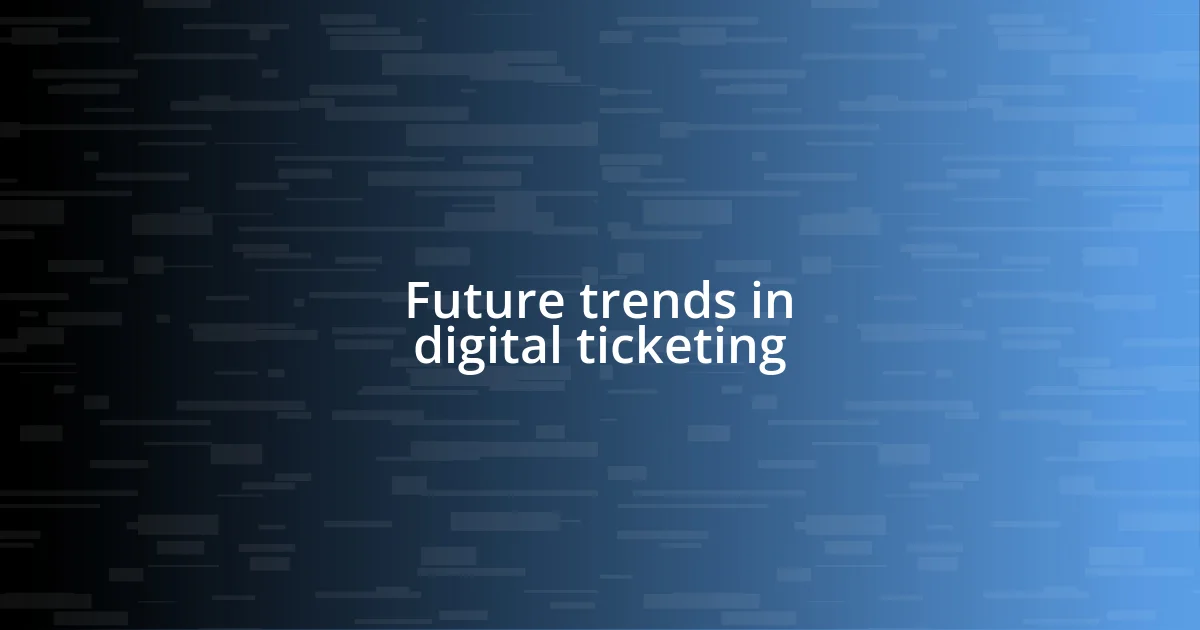
Future trends in digital ticketing
As I look ahead, one trend in digital ticketing that stands out is the increased integration of artificial intelligence (AI). Imagine purchasing tickets effortlessly, with AI predicting your preferences and suggesting events tailored specifically to you. I recently used an event platform that subtly guided me towards concerts I never knew I’d love, simply based on my previous likes. How incredible would it be if this kind of personalization became the norm?
Another trend to watch for is the rise of contactless solutions. I vividly remember glancing around a packed venue, all of us anxiously holding out our phones to scan tickets. With the growing concern for health and safety, speedier and more secure contactless options will likely become the standard. Who wouldn’t appreciate a hassle-free entry experience, allowing me to focus on enjoying the event rather than fumbling with my phone?
Lastly, data security will be paramount in the future of digital ticketing. Having my personal information at risk is a genuine concern. I recall being part of a ticketing breach, where users’ data was compromised, and it left me feeling vulnerable. It’s crucial that as digital ticketing systems evolve, they implement robust security measures that not only protect our data but also instill confidence in users. Can we truly enjoy an event if we’re worried about our online safety? The answer is a firm no, and I hope systems will prioritize this as they develop.

Real world examples of success
One standout example of successful digital ticketing implementation is the way major sports leagues, like the NFL, have embraced mobile ticketing. I remember attending a football game where my ticket was securely stored on my phone. When I arrived at the stadium, scanning my digital ticket was quick and seamless—there was no need to worry about losing a physical ticket. This streamlined process not only enhanced my game-day experience but also demonstrated how effective digital solutions can be in managing large crowds.
Another inspiring case is the success of the ticketing app used by live event platforms like Ticketmaster and Eventbrite. I had the chance to use their app for a local festival, and I found it fantastic. Real-time updates about schedules and set changes were easily accessible, making it simple to adjust my plans on-the-fly. Have you ever felt that thrill of spontaneity at an event where everything just flowed? It reinforced my belief that effective digital ticketing can truly elevate the attendee experience.
A particularly memorable example comes from my experience with a recent music festival. The event organizers implemented a self-check-in feature through their ticketing app. Instead of waiting in long lines, I simply scanned my QR code upon arrival and was promptly welcomed in. That feeling of walking directly into the event, bypassing the stress and hassle, was exhilarating. It made me think—shouldn’t every event strive for this kind of convenience and satisfaction? The success of this approach showed me firsthand that digital ticketing can not only enhance efficiency but also deepen our connection to the events we love.












